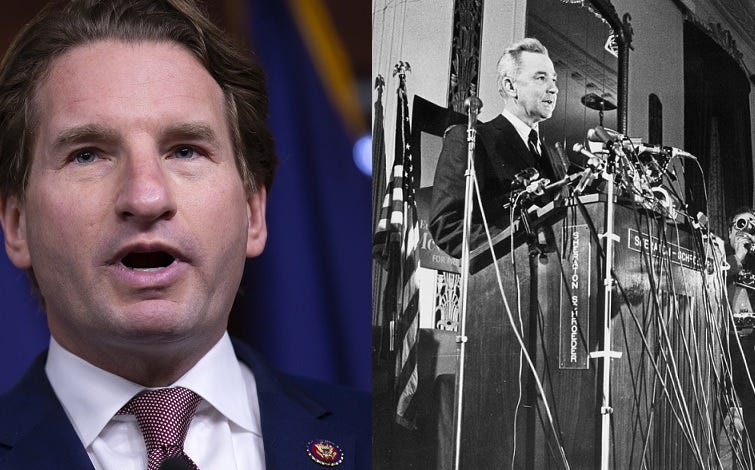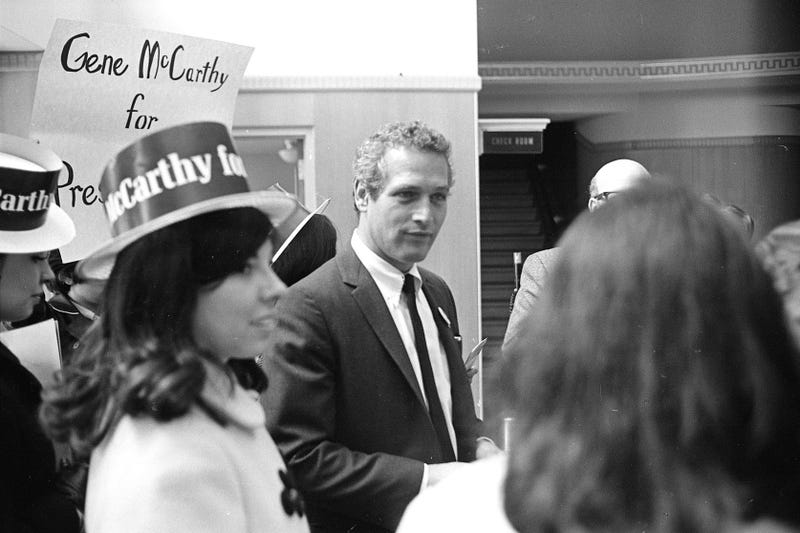
Minnesota Congressman Dean Phillips's challenge of President Biden is drawing comparisons to a similar 1968 campaign.
Emeritus Professor of Political Science at Carleton College Steven Schier explains how they are related.
"On March 12th, 1968 Senator Eugene McCarthy of Minnesota got 42% of the vote in the New Hampshire primary to the incumbent Democratic President Lyndon Johnson's 48%," says Schier. "This was a big surprise at the White House."
Schier says history could be repeating itself.
"Here it is, 2023, we now have a Democratic Congress person from Minnesota, Dean Phillips, challenging a sitting Democratic President Joe Biden in the New Hampshire primary," says Schier. "Will this have the same effect on Biden's political future as McCarthy's insurgency had in 1968 had on Lyndon Johnson's hold on the White House. We shall see."
Schier does note that Biden is not going to be on the ballot in New Hampshire because the state is violating national party rules about when to hold their primary. Biden will wait for the South Carolina primary which the Democratic National Committee has approved.
This gives Phillips the opportunity to campaign in the state and try and get a large percentage of the vote. And that could give him similar momentum McCarthy got in 1968.
"Biden is not that popular in New Hampshire," says Schier. "His average poll rating in a multicandidate field is only about 29%, so he's not the majority choice right now in New Hampshire. Biden finished fifth in 2020 with only 8.4% of the vote. So this is not great territory for the incumbent president, but it is very favorable territory for an insurgency like Dean Phillips."
Schier says the level of Phillips success in his campaign could inspire others to join the race.
"Phillips is the only serious rival for the Democratic nomination to President Biden at this point," Schier says. "There are other candidates who might emerge but probably wouldn't emerge unless Phillips does particularly well in challenging President Biden."
Phillips is expected to formally announce he'll be challenging Biden in the primary by the Friday deadline in New Hampshire.
As for 1968, McCarthy's campaign ultimately fizzled out in what became a crowded Democratic field.
After winning the New Hampshire primary, President Johnson withdrew from the race in March, giving his famous speech from the Oval Office in which he declared he wouldn't continue his campaign.
"I shall not seek, and I will not accept, the nomination of my party for another term as your President," after an almost 40-minute speech mostly about Vietnam, a conflict that drew McCarthy into the race.
Minnesota's Eugene McCarthy campaigned against Johnson based on his anti-war views, and drew significant support from young voters and celebrities who wanted the U.S. out of Southeast Asia. The "hippies" of the late-60s somehow identified with the Midwestern Senator merely because he didn't believe in "the war".

"But we do have one war which is properly called a war-- the war in Vietnam, which is central to all of the problems of America," said McCarthy in December of 1967. "A war of questionable legality and questionable constitutionality. A war which is diplomatically indefensible; the first war in this century in which the United States, which at its founding made an appeal to the decent opinion of mankind in the Declaration of Independence, finds itself without the support of the decent opinion of mankind."
There were other Democratic contenders who got into the race. Famously, Bobby Kennedy ran for the Democratic nomination but was killed by an assassin in June.
Then there was the infamous 1968 Democratic National Convention, a watershed moment for politics in America and it was met with widespread anti-war protests and violence in the streets of Chicago. Over 600 protestors were eventually arrested in Chicago during the convention.
Kennedy's assassination helped derail the convention, paving the way for Johnson's Vice President, Hubert Humphrey. Humphrey was a former Minnesota Senator and Mayor of Minneapolis who became Minnesota's most famous politician. He shared Johnson's mostly pro-Vietnam viewpoints and he defeated the upstart McCarthy and a late entrant for the nomination George McGovern.
Humphrey, who had not entered any of the thirteen state primary elections, won the Democratic nomination shortly after midnight, and many delegates shouted, "No! No!" when his victory was announced. Many believed that the Democratic "machine" led by both Johnson and Mayor Richard Daley of Chicago helped push the delegates to vote Humphrey despite widespread support for McCarthy.
Humphrey would eventually lose the Presidential Election to Republican Richard Nixon.
Before we know how the next Election shakes out, and Phillips' chances of becoming the first to unseat a sitting president in modern U.S. political history, there is a long ways to go.
The 2024 Democratic National Convention by the way? Being held in Chicago. Of course.....
